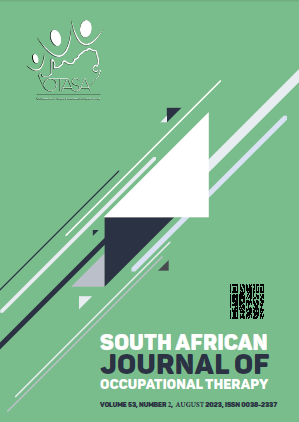Assessment of participation in collective occupations: Domains and items
DOI:
https://doi.org/10.17159/2310-3833/2023/vol53n2a9Keywords:
Collective participation, Co-occupation, VdTMoCA, Creative ability, Occupational therapy, Health programmesAbstract
Introduction: Occupational therapists work with groups of people who engage in collective occupations to have a positive influence on their health and wellbeing. Although the concept of collective occupations is described and defined in occupational science literature, little has been done on specific assessment tools to guide clinicians on how well people are engaging in collective occupations
Aim: This article describes the development of an assessment tool to assess participation in collective occupations in a South African context
Method: A mixed methods approach with a sequential exploratory design was used. Domains and items were generated from a literature review on collective occupations as well as semi-structured interviews with occupational therapy experts in community settings. Data were thematically analysed using a priori coding. The Vona du Toit Model of Creative ability was used to frame the coding. Domains and items emerged from the data
Results: The result was the development of five domains and 19 items that could be used to measure and describe collective participation in occupations. Domains include collective's motivation, ability to perform action, ability to form a collective, ability to produce and end product, emotional-cognitive functioning and collective relations
IMPLICATIONS FOR PRACTICE:
To work with groups of people, clinicians not only need to understand the nature of collective participation but also need to understand why people participate in them. They should also have insight in the abilities needed to effectively participate as a collective. Understanding of a collective's behaviour in the above-mentioned domains, could guide occupational therapists in planning intervention to enhance collective participation in occupations. The levels of collective participation could guide occupational therapists to gain insight into the potential and behaviour of collectives. Such understanding can enable effective intervention-, preventive- and promotive health programmes with collectives.
Downloads
References
See PDF for full list of References
Downloads
Published
Issue
Section
License
Copyright (c) 2023 South African Journal of Occupational Therapy

This work is licensed under a Creative Commons Attribution-NonCommercial-NoDerivatives 4.0 International License.
How to Cite
- Abstract 244
- PDF 83




.png)